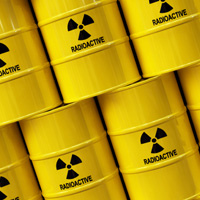Senior Program Officer Theo Kalionzes writes about the complexities and promises of nuclear energy as we address the global climate and energy crises.
"Nuclear energy has a place at the COP 27 table—the world needs #Atoms4Climate,” Ambassador Rafael Grossi, the head of the United Nations (UN) agency that monitors and verifies nuclear activities around the globe, shared this hopeful message as diplomats, scientists, policy experts, and activists gathered on the Red Sea, in Sharm El-Sheikh, Egypt, for the UN Climate Change Conference (COP 27).
COP 27 took place amid fresh alarm about the climate emergency, the global energy crisis, and a fast-evolving debate about the role of nuclear energy in addressing both.
It included a series of events on nuclear energy’s value for climate change mitigation, energy security, and achieving the UN Sustainable Development Goals. There was even an #Atoms4Climate pavilion. Growing attention to nuclear energy at COP reflects a new wave of assessments pointing to a more nuclearized 21st century, amid a “breakout year” for advanced reactor companies alongside a growing list of new build announcements. The International Energy Agency projects investment in clean energy—including new nuclear projects—will increase by $2 trillion annually by 2030. Major U.S. federal legislation with billions for nuclear technology is another part of the trend.
Yet the expansion of nuclear energy around the world to fight climate change would bring unmistakable challenges that require vision, creativity, and leadership to manage safely. At MacArthur, we have conducted exploratory grantmaking on the nuclear-climate nexus in recent years, funding a variety of exceptional organizations like the Council on Strategic Risks, the Clean Air Task Force, the Good Energy Collective, the Partnership for Global Security, the Nuclear Threat Initiative, the Stimson Center, and Third Way. This grantmaking supports experts in science and policy who pursue productive dialogue and develop new ideas for nuclear governance.
As the climate crisis accelerates, we have found it useful to maintain a balanced assessment about nuclear energy and its future. That is, we acknowledge the tragic history of nuclear technologies and the unique safety and security risks they can pose—from the Fukushima nuclear accident in 2011 to the active case of the Zaporizhzhia facility in Ukraine, which Putin has recklessly transformed from the largest civilian nuclear plant in Europe into an active war zone. And perhaps most significant is the unavoidable fact that civilian nuclear technology is fundamentally connected to the world’s most dangerous weapons.
But amid a dramatically worsening climate crisis, our assessment of nuclear energy cannot stop there. We must equally recognize the technology’s profound climate value. This balanced assessment has proven useful for us in seeding meaningful progress on an energy source that comes with a never-ending supply of hope, fear, and loathing.
This framing also helps maintain focus on what is most important: anticipating and managing the implications of a decarbonized global economy that is fueled by more nuclear reactors, fuel cycle facilities, and materials. It means supporting nonproliferation experts to collaborate with advanced reactor technology developers to embed safety and security features at the early stages. It means identifying creative ways to support critical institutions like the International Atomic Energy Agency whose mission—to verify that nuclear activities around the world remain peaceful—is bound to grow.
Our grantmaking has explored silo-busting engagement among stakeholders with dramatically different incentives, cultures, and identities—including experts from the nuclear and climate communities, private industry, and officials from governments and international organizations. We believe that meaningful engagement among such a diverse array of actors is necessary for success on a topic so multifaceted, controversial, and urgent. As the climate crisis intensifies and nuclear energy gains new momentum, this is an important part of our Nuclear Challenges capstone.



